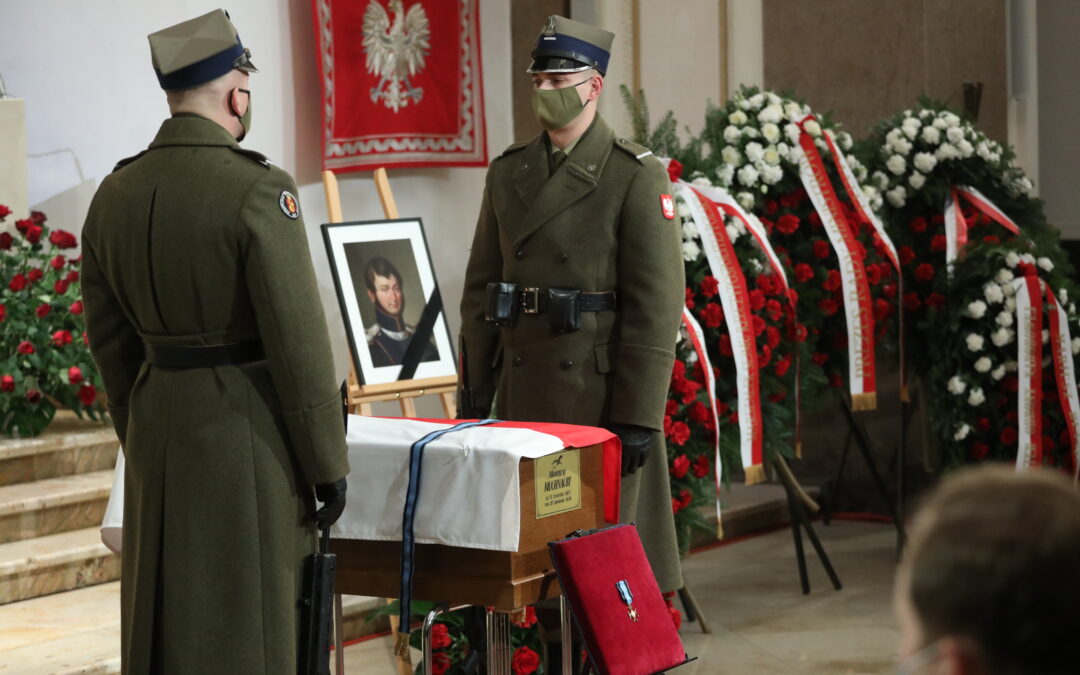The remains of a 19th century activist for Polish independence, Maurycy Mochnacki, have been returned to Poland and reburied in a ceremony attended by the prime minister, Mateusz Morawiecki. The president, Andrzej Duda, said that Mochnacki’s memory is particularly important at a time when Poland is again under threat from the east.
Mochnacki, who was sentenced to hanging for his part in the failed November Uprising of 1830-31 against Russian rule, went into exile in France, like many Polish elites at a time when the country was partitioned between Prussia, Austria-Hungary and Russia. He died and was buried in Auxerre in 1834.
“Mochnacki was one of the forefathers of Polish independence,” said Morawiecki on Saturday during a mass at the Field Cathedral of the Polish Army to mark the reburial of Mochnacki in Warsaw’s Powązki military cemetery. His remains had earlier been flown from France to Warsaw’s Okęcie airport.
🇵🇱 PM @MorawieckiM paid tribute to Maurycy Mochnacki: "A soldier who is going into battle puts on a an immortal so that he can be identified if he dies in battle. Mochnacki suffered many wounds during the November Uprising. One could say that his wounds became such an immortal". pic.twitter.com/H83NRAM98g
— Chancellery of the Prime Minister of Poland (@PremierRP_en) November 27, 2021
Morawiecki also noted that Mochnacki – a writer whose works included the unfinished book Uprising of the Polish Nation in 1830 and 1831 – helped “build a modern, contemporary Polish identity”, reports TVP Info.
Mochnacki had always told his family that he would not return to Poland until it was “whole and independent”, said Marta Ławacz, a direct descendent of Mochnacki’s brother, Tymoleon, who also fought in the November Uprising, which after initial successes was crushed by the Russians.
Poland was divided between the three partitioning powers from the late 18th century until 1918, when it remerged onto the map of Europe following World War One. However, after two decades of independence it then found itself again partitioned by Nazi Germany and the Soviet Union in 1939, before falling under postwar communist rule.
Poland has created a new state holiday – the National Day of the Victorious Greater Poland Uprising – to commemorate a successful insurrection against German rule in 1918-19 https://t.co/BVddmNoKDA
— Notes from Poland 🇵🇱 (@notesfrompoland) November 24, 2021
Morawiecki noted that this year the gravestones of other Polish independence fighters buried in Auxerre – Tomasz Konarski and Konstanty Parczewski – have also been renovated. “We cannot allow our great heroes to remain anonymous,” he declared, quoted by RMF24.
Duda’s chief of staff, Paweł Szrot, also attended Saturday’s ceremony. He read a letter from the president that hailed Mochnacki’s “vision of a strong Poland, built around a sense of community of all citizens”.
Duda said that Mochnacki’s message is especially important today, “when Poland is the target of a hostile attack” at its eastern border. He showed that “our greatest weapon is unity, and our greatest weakness is allowing ourselves to argue and be diverted from what is most important”, wrote the president.
Trumna ze szczątkami Maurycego Mochnackiego powitana z honorami w asyście wojskowej w Warszawie https://t.co/RMC8CLBxN0 pic.twitter.com/aczOexsJEM
— Dzieje.pl (@dziejepl) November 27, 2021
In May this year, a delegation led by a Polish diplomat from the embassy in Paris took bone samples from Mochnacki’s grave to authenticate his remains. His coffin had been moved several times, so there were doubts over whether he was buried in the grave bearing his name.
After his identity was confirmed, his remains were on Saturday flown back to Warsaw on a military aircraft accompanied by Polish soldiers and a government delegation, reports Polsat.
Among those to take part in the reburial ceremony in Warsaw was France’s ambassador to Poland, Frédéric Billet. He described Mochnacki as a “hero of the November Uprising and representative of the Great Emigration”, the name given to exiled 19th century Polish elites in France.
Wziąłem wczoraj udział w uroczystościach pogrzebowych Maurycego Mochnackiego, bohatera Powstania Listopadowego, przedstawiciela Wielkiej Emigracji 🇵🇱 we Francji, którego prochy powróciły do Polski z #Auxerre. ➡️ https://t.co/NIaF3JUUHo
— Frédéric Billet (@Amb_Francji) November 28, 2021
Main image credit: Sejm

Daniel Tilles is editor-in-chief of Notes from Poland. He has written on Polish affairs for a wide range of publications, including Foreign Policy, POLITICO Europe, EUobserver and Dziennik Gazeta Prawna.




















